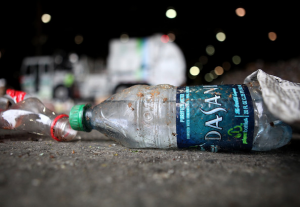Contributing to the 32 Million Barrels
Over the past week, seeing how many plastic water bottles I buy and rarely use more than once has definitely reinforced my decision to avoid them completely for the next month. With the exception of going to Marquis or Upper, whenever I eat a meal on campus I will usually buy a new water bottle or fountain drink in a paper cup. Although I usually carry around one of these purchased bottles for a day, it is ultimately discarded or forgotten about before the next day. Sometimes when this happens, I do reflect on how wasteful I’m being, but end up justifying my behavior with “It’s just one water bottle, next time I’ll remember my reusable one” (which never happens).
I have noticed I’m definitely more likely to buy another, unnecessary water bottle when I’m not carrying a backpack around and going to class. Going to a friend’s dorm or to get food after class, I cannot think of the last time I brought a water bottle with me. Knowing that I can probably buy a new beverage wherever I go, I rarely remember let alone want to carry one more thing with me on a quick trip.
Not only do millions of plastic bottles (about 75%) end up in landfills if they are not recycled, but producing the bottles in the first place is expensive and environmentally costly. In 2007, in the United States alone, the energy cost to produce and then transport plastic water bottles was calculated to be between 32 and 54 million barrels of oil (Pacific Institute, 2007). This energy would be enough to power about 190,000 homes if everyone were to cut the unnecessary habit. It has also been estimated that each water bottle in fact uses the equivalent of 3 bottles of water to be created! The convenience of using a new plastic bottle each time we want water has only come about relatively recently. Several studies have shown that, for the most part, water that’s bottled is no cleaner than what comes out of our taps or filtered water stations. Although it’s really not difficult to make the switch to using a reusable bottle, I (and many other people) am so used to grabbing just one more Dasani bottle from the fridge at Lower and forgetting about it later. With a little effort and more environmental thoughtfulness, changing my habit should be a rewarding and lasting experience.
Pacific Institute. “Fact Sheet: Bottled Water and Energy – Getting to 17 Million Barrels.” December 2007.
Fishman, Charles. “Message in a Bottle.” Fast Company Magazine July 2007.

Leave a Reply